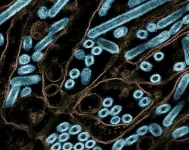(Press-News.org) The U.S. Department of Energy (DOE) recently granted the Atlantic Marine Energy Center (AMEC) $12 million to expand research and development in marine energy initiatives. AMEC comprises four universities including the University of New Hampshire, Stony Brook University, the Coastal Studies Institute, and Lehigh University.
In total, DOE’s Water Power Technologies Office invested more than $41 million in this latest round of funding using the Bipartisan Infrastructure Law (BIL) to four university-led National Marine Energy Centers located across the country. The centers will use the funds to support research, infrastructure improvements, strategy, administration, outreach, and communications around their projects.
The grant follows the $9.7 million that DOE awarded the four AMEC universities in 2021, which served to initially establish the center.
“This is a five-year award that will allow us to expand the scope and reach of AMEC,” says AMEC co-director Arindam Banerjee, who is Lehigh’s Paul B. Reinhold Professor of Mechanical Engineering and Mechanics and department chair in the P.C. Rossin College of Engineering and Applied Science. “And we’ll be doing that by, among many things, developing a series of week-long summer courses, launching new research projects, and improving our test facilities.”
The new courses are currently being developed by Banerjee and AMEC associate director Shalinee Kishore, the Iacocca Chair Professor of Electrical and Computer Engineering and director of Lehigh’s Institute for Cyber Physical Infrastructure and Energy (I-CPIE). They’ll run as two-week classes starting next summer, and topics will include instrumentation for marine energy, marine resource characterization, coastal microgrids, and flexible structures for marine energy. Six new classes will be offered, with some open to all who are interested, while others will target students and professionals currently researching and/or working in the field.
“We’ll have two tiers of courses,” says Banerjee. “The first will be like a boot camp, where students will be exposed to the fundamentals of marine energy systems. It might attract, for example, a senior from any engineering major who is curious about marine energy but doesn’t want to commit to a traditional course. They’ll get a good introduction to the fundamentals and the experts, and hopefully it will help guide their decision about graduate school. The second tier of classes will be highly specialized, graduate-level courses that give students and professionals an immersive experience in a single topic within marine energy.”
A second key part of this newest grant will see Lehigh take the lead on two research projects—one focused on the structural performance of tidal turbine blades under turbulent loading, and the other on real-time stable marine energy microgrid power management for coastal communities.
“Our original AMEC team here at Lehigh consists of seven faculty members, and we’ve now added three more, all of whom are involved in these projects,” says Banerjee, who will be running the first project out of his own lab, Lehigh’s Tidal Turbulence Test Facility.
That project will involve small-scale testing of turbine blades in Banerjee’s lab followed by large-scale numerical simulations at Lehigh’s High-Performance Computing Center conducted by Parisa Khodabakshi, an assistant professor of mechanical engineering and mechanics and one of the new faculty members of AMEC. Large-scale experiments will be performed at Lehigh’s Advanced Technology for Large Structural Systems (ATLSS) Engineering Research Center by Richard Sause, the Joseph T. Stuart Professor of Structural Engineering.
“Typically, experiments or simulations are done at one scale,” says Banerjee. “This is a unique study in that we’re doing experiments across scales and using simulations to serve as a bridge between them.”
The second project will attempt to integrate marine renewable energy resources, in this case, wave energy converters, into coastal microgrids. It’s a multidisciplinary effort that includes Farrah Moazeni, an assistant professor of civil and environmental engineering; Javad Khazaei, an assistant professor of electrical and computer engineering (both Moazeni and Khazaei are also among the latest to join AMEC); and Banerjee.
“Our aim is to design a real-time, closed-loop control system for marine energy microgrids that not only optimally allocates energy resources, but also guarantees stability in the face of fluctuations and uncertainties from loads, weather, and renewable resources,” says Moazeni, who will lead the project as well as teach one of the advanced short courses next summer. “Coastal and island communities often lack access to reliable and stable energy sources, so this project is ultimately about equity as well as climate adaptation. With this grant, I hope we can take a meaningful step toward providing stable energy resources capable of withstanding the challenges posed by climate change to these vulnerable communities.”
Additionally, Lehigh will contribute data and the expertise of Muhannad Suleiman and Paolo Bocchini—both professors in the Department of Civil and Environmental Engineering and members of AMEC—to several other projects led by other institutions within AMEC.
The grant also supports more infrastructure improvements that will facilitate both these and future projects. For example, Khazaei, who is the director of the Integrated, Resilient, and Intelligent Energy Systems (INTEGRITY) Laboratory—will lead the development of a multi-port converter for marine renewable energy integration to coastal community microgrids.
“There is significant potential for energy extraction from the ocean, which is an area that remains largely underexplored,” says Khazaei. “This latest AMEC award offers Lehigh the opportunity to delve into new research areas and foster multidisciplinary collaborations that were previously out of reach.”
As part of the award, the Lehigh AMEC team will also conduct community outreach to showcase the work of the center, contribute to ongoing strategy and implementation plans for AMEC and for all the nation’s marine energy centers, and participate in performance reviews.
“The first AMEC award got Lehigh established as a center, and with this latest funding, we’re starting the real work of making marine energy part of the solution to decarbonization and to meeting our nation’s energy needs,” says Banerjee. “I’d love to time travel to July 2029 when the period for this grant is up to see all that we’ve accomplished. It’s a very exciting time to be in this field, and lead a group of faculty members who are all committed to sustainability and making the planet a better place to live in for our future generations.”
Related Links
Atlantic Marine Energy Center (AMEC)
Faculty Profile: Arindam Banerjee
Faculty Profile: Shalinee Kishore
Faculty Profile: Parisa Khodabakhshi
Faculty Profile: Richard Sause
Faculty Profile: Faegheh (Farrah) Moazeni
Faculty Profile: Javad Khazaei
Faculty Profile: Muhannad T. Suleiman
Faculty Profile: Paolo Bocchini END
DOE awards $12 million to expand marine energy initiatives at Lehigh and partner universities
Additional funding will propel new research projects, infrastructure, and educational programs through the Atlantic Marine Energy Center (AMEC)
2024-10-28
ELSE PRESS RELEASES FROM THIS DATE:
Pythons can swallow even bigger prey than scientists realized
2024-10-28
Burmese pythons can consume prey even larger than scientists realized, according to a new study.
That means more animals are on the menu across southern Florida, where the nonnative, invasive snakes have decimated populations of foxes, bobcats, raccoons and other animals.
Pythons swallow deer, alligators and other prey whole. What they eat is limited in part by how big an animal they can wrap their flexible, stretchy jaws around. Researchers call this the snake’s gape.
University of Cincinnati Professor Bruce Jayne said measurements of snakes captured in and around Everglades National Park show that the biggest pythons have an even bigger gape than mathematical ...
Evidence mounts for dark energy from black holes
2024-10-28
Image
Almost 14 billion years ago, at the very beginning of the Big Bang, a mysterious energy drove an exponential expansion of the infant universe and produced all known matter, according to the prevailing inflationary universe theory.
That ancient energy shared key features of the current universe's dark energy, which is the largest mystery of our time by at least one objective standard: It makes up the majority—roughly 70%—of the universe, but scientists ...
AI might scare us, but can we scare it?
2024-10-28
In recent years, advancements in artificial intelligence have enabled intelligent machines to generate visual art, compose music, and create videos. They converse with us, help with homework, and have even begun competing for our jobs. Amid these advances, machines evoke powerful reactions from humans—sparking concerns about control, fairness, and the potential for misuse. Many feel unsettled by the growing presence of intelligent machines when they inadvertently reinforce power imbalances and perpetuate injustices.
Amid all of this disruption and mistrust, we are comforted to know that machines can`t have emotions. Yet, recent advancements in language-based AI have demonstrated ...
Early intervention in patients with asymptomatic severe aortic stenosis and myocardial fibrosis
2024-10-28
About The Study: In asymptomatic patients with severe aortic stenosis and myocardial fibrosis, early aortic valve intervention had no demonstrable effect on all-cause death or unplanned aortic stenosis–related hospitalization. The trial had a wide 95% CI around the primary end point, with further research needed to confirm these findings.
Corresponding Author: To contact the corresponding author, Marc R. Dweck, PhD, email marc.dweck@ed.ac.uk.
To access the embargoed study: Visit our For ...
Rutgers receives $3.3 million federal grant to recruit counselors for high-need schools
2024-10-28
Rutgers University’s Graduate School of Education (GSE) has received a $3.3 million grant to increase the number and diversity of highly trained school counselors to help fill the gap in mental health services in New Jersey high-need school districts.
The Mental Health Service Professional Demonstration grant from the U.S. Department of Education – part of a federal initiative to expand nationwide student access to school-based mental health services – will fund the GSE-led School Counseling Prevention to Intervention project.
“School counseling is often a misunderstood and under-resourced profession,” said Ian Levy, an assistant professor of school counseling ...
Bovine H5N1 influenza from infected worker transmissible and lethal in animal models
2024-10-28
WHAT:
A highly pathogenic avian influenza (HPAI) H5N1 virus, isolated from the eye of a farm worker who became infected through contact with dairy cows, was lethal in mice and ferrets infected in a high-containment laboratory environment, according to a new study in Nature. The study investigators also found that the virus isolated from the worker, who experienced mild inflammation of the cornea (conjunctivitis), could be transmitted through the air between separated ferrets and might be capable of binding to and replicating in human respiratory tract cells.
The virus isolated from the worker is called huTX37-H5N1 and has a mutation (PB2-E627K) frequently seen in avian influenza viruses ...
Marzougui & Kan receive funding for crash testing
2024-10-28
Dhafer Marzougui, Associate Professor, Physics and Astronomy, College of Science, and Cing-Dao Kan, Professor/Director, Center for Collision Safety and Analysis, College of Science, received funding for: “NCHRP Project 03-110-01.”
Marzougui and Kan aim to identify and evaluate the crash performance of breakaway sign and luminaire supports and crashworthy work-zone traffic control devices that are non-proprietary and commonly used.
The researchers will examine in-service safety performance, potential failure modes (and, if possible, design modifications that might address ...
Global leaders in the fight against cancer gathered in Washington, DC on October 18, 2024, for the NFCR Global Summit and Award Ceremonies for Cancer Research & Entrepreneurship
2024-10-28
Washington, DC – The 2024 National Foundation for Cancer Research (NFCR) Global Summit and Award Ceremonies for Cancer Research & Entrepreneurship, co-hosted with the AIM-HI Accelerator Fund, convened the world’s top experts across cancer research, biotech entrepreneurship, pharmaceuticals, investment, and patient advocacy. This prestigious event, held at the National Press Club, served as a unique forum for advancing groundbreaking science, fostering innovative collaborations, identifying ...
New research highlights economic and employment challenges for parents of medically complex babies
2024-10-28
Parents with babies born preterm or with low birth weight face significant economic and employment challenges, according to new research published in JAMA Pediatrics.
The study, led by Erin Von Klein, MD, a neonatology fellow at Monroe Carell Jr. Children’s Hospital at Vanderbilt, reveals that 30% of parents with a very low birth weight baby (under 1,500 grams or 3.3 pounds) have had to make an employment decision based on their child’s health and the required ongoing care after discharge from the neonatal intensive care unit.
"The lower the child's birth weight, the more likely a parent was to make one of these decisions," said Von Klein. "Of parents with ...
Prenatal cannabis exposure and executive function and aggressive behavior at age 5
2024-10-28
About The Study: Results from this contemporary U.S. cohort where prenatal cannabis exposure was common and indicated that exposed children exhibited some differences in aspects of executive function and behavior relevant to long-term academic success and adaptive functioning. These results may be considered in refining clinical recommendations regarding cannabis use during pregnancy.
Corresponding Author: To contact the corresponding author, Sarah A. Keim, PhD, email sarah.keim@nationwidechildrens.org.
To ...
LAST 30 PRESS RELEASES:
Exploring the link between hearing loss and cognitive decline
Machine learning tool can predict serious transplant complications months earlier
Prevalence of over-the-counter and prescription medication use in the US
US child mental health care need, unmet needs, and difficulty accessing services
Incidental rotator cuff abnormalities on magnetic resonance imaging
Sensing local fibers in pancreatic tumors, cancer cells ‘choose’ to either grow or tolerate treatment
Barriers to mental health care leave many children behind, new data cautions
Cancer and inflammation: immunologic interplay, translational advances, and clinical strategies
Bioactive polyphenolic compounds and in vitro anti-degenerative property-based pharmacological propensities of some promising germplasms of Amaranthus hypochondriacus L.
AI-powered companionship: PolyU interfaculty scholar harnesses music and empathetic speech in robots to combat loneliness
Antarctica sits above Earth’s strongest “gravity hole.” Now we know how it got that way
Haircare products made with botanicals protects strands, adds shine
Enhanced pulmonary nodule detection and classification using artificial intelligence on LIDC-IDRI data
Using NBA, study finds that pay differences among top performers can erode cooperation
Korea University, Stanford University, and IESGA launch Water Sustainability Index to combat ESG greenwashing
Molecular glue discovery: large scale instead of lucky strike
Insulin resistance predictor highlights cancer connection
Explaining next-generation solar cells
Slippery ions create a smoother path to blue energy
Magnetic resonance imaging opens the door to better treatments for underdiagnosed atypical Parkinsonisms
National poll finds gaps in community preparedness for teen cardiac emergencies
One strategy to block both drug-resistant bacteria and influenza: new broad-spectrum infection prevention approach validated
Survey: 3 in 4 skip physical therapy homework, stunting progress
College students who spend hours on social media are more likely to be lonely – national US study
Evidence behind intermittent fasting for weight loss fails to match hype
How AI tools like DeepSeek are transforming emotional and mental health care of Chinese youth
Study finds link between sugary drinks and anxiety in young people
Scientists show how to predict world’s deadly scorpion hotspots
ASU researchers to lead AAAS panel on water insecurity in the United States
ASU professor Anne Stone to present at AAAS Conference in Phoenix on ancient origins of modern disease
[Press-News.org] DOE awards $12 million to expand marine energy initiatives at Lehigh and partner universitiesAdditional funding will propel new research projects, infrastructure, and educational programs through the Atlantic Marine Energy Center (AMEC)





